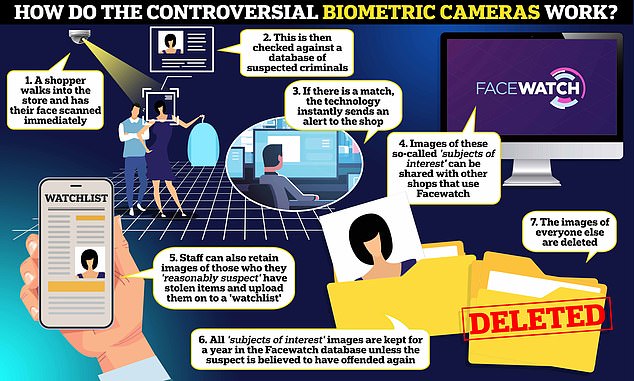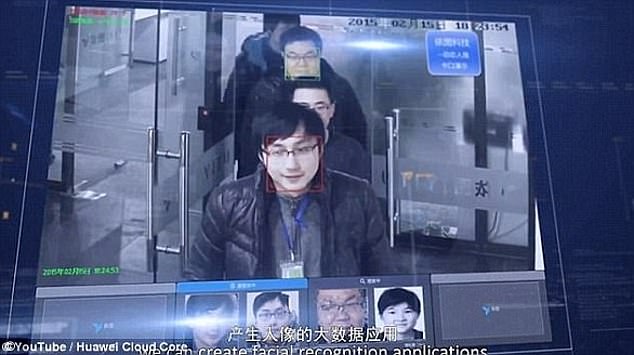Sports Direct, Spar, Budgens, Costcutter and Southern Co-op are now among the growing number of British retailers using a controversial Chinese state-owned facial-recognition system.
The biometric cameras work by scanning the faces of shoppers so they can be checked against a database of suspected criminals.
But they have been branded ‘Orwellian’ and ‘unlawful’ by critics, who claim that staff could add people to a secret ‘blacklist’ without them knowing.
So how does the facial-recognition system work, and which shops are already using it?
Here, MailOnline breaks down everything you need to know about the controversial technology.

The biometric cameras work by scanning the faces of shoppers so they can be checked against a database of suspected criminals

Sports Direct, Spar, Budgens, Costcutter and Southern Co-op are now among the growing number of British retailers using a controversial Chinese state-owned facial-recognition system
How does it work?
Facewatch, the UK firm which supplies the Chinese-made cameras, claims that its surveillance system is 97.8 per cent accurate at recognising faces.
It has previously stressed that its database only retains images of previous offenders, and none of these have been shared with police.
Under the Facewatch system, cameras scan the faces of all those who enter a shop.
These are then checked against a database of suspected criminals and if there is a match, the technology instantly sends an alert to the shop.
Staff can also retain images of those who they ‘reasonably suspect’ have stolen items or committed other crimes and upload them on to a ‘watchlist’ that is shared with other shops that use Hikvision cameras.
All of these so-called ‘subjects of interest’ images are kept for a year in the Facewatch database, unless the suspect is believed to have offended again.
The images of everyone else are deleted.
Under data protection laws, companies that capture facial recognition images must ensure that the processing of the information ‘can be justified as fair, necessary and proportionate’.
Where is it used?
Independent grocery chain Southern Co-op has installed the cameras in 35 stores across Portsmouth, Bournemouth, Bristol, Brighton and Hove, Chichester, Southampton and London.
An investigation by campaign group Big Brother Watch, shared exclusively with The Mail on Sunday, also identified a string of stores run by Frasers Group that have installed the so-called ‘Facewatch’ facial recognition system to detect shoplifters.
They included 13 Flannels, 12 Sports Direct and two USC stores.

Sports Direct, Spar, Budgens, Costcutter and Southern Co-op are now among the growing number of British retailers using Chinese state-owned facial-recognition cameras (pictured)

Staff at Sports Direct – controlled by billionaire Mike Ashley – are alerted as soon as the artificial intelligence cameras identify an offender so they can either escort them from the shop or closely monitor them

Southern Co-Op is independent of the larger Co-op chain but runs more than 200 stores in southern England under the same brand. Pictured: a Southern Co-Op in Alresford, Hampshire
Some Spar, Budgens, Costcutter and Nisa shops are also using them.
Staff at the Sports Direct retail empire – controlled by billionaire Mike Ashley – are alerted as soon as the artificial intelligence cameras identify an offender so they can either escort them from the shop or closely monitor them.
The company, which has more than 950 UK stores, has declared that ‘the rollout continues’, raising the prospect that the technology could soon be commonplace on the high street.
Why is it controversial?
The Chinese Hikvision cameras, sold by UK surveillance firm Facewatch, have been listed as a national security threat in the US, while the UK’s Ministry of Defence has issued guidance not to use the company’s equipment and MPs have called for a ban.
Hikvision has also been blacklisted by US authorities over links to human rights abuses against Muslim Uighurs in China.

Opposed: But they have been branded ‘Orwellian’ and ‘unlawful’ by critics, who claim that staff could add people to a secret ‘blacklist’ without them knowing
Privacy campaign group Big Brother Watch, meanwhile, has launched a legal challenge with the Information Commissioner’s Office (ICO).
Its complaint claims that the Facewatch system breaches data protection laws because the information is processed in ways which are not proportionate to the need to prevent crime.
The group’s director Silkie Carlo said: ‘Our legal complaint to the Information Commissioner is a vital step towards protecting the privacy rights of thousands of people who are affected by this dangerously intrusive, privatised spying’.
She said the use of the live facial recognition surveillance was ‘Orwellian in the extreme, highly likely to be unlawful, and must be immediately stopped by the Information Commissioner.’
Why is it needed?
Crime experts say shopping chains are being forced to take action amid an ‘epidemic’ of shoplifting and the police’s failure to arrest thieves.
It claimed staff could add individuals to a watch-list where their biometric information is kept for up to two years.

Concerns: Privacy rights group Big Brother Watch has launched a legal challenge over their use in the UK (stock image)
Shoplifting has rocketed from 2.9 million incidents in 2016/17 to 7.9 million last year, according to the British Retail Consortium.
The cost to retailers almost doubled from £503 million to £953 million in the same period.
Daniel Garnham, an ex-police officer and president of the Security Industry Federation, which represents security guards, said police regard shoplifters who steal items worth less than £200 as a ‘low priority’ and will not arrest them.
David McKelvey, a former Detective Chief Inspector at the Metropolitan Police who now runs a private investigations firm, said many retailers ‘no longer bother calling the police’ when criminals target their stores.












